Read in Arabic here.
Since 2015, Yemen has been embroiled in a devastating war between the Houthi rebels and a Saudi-led coalition. Described by the United Nations as the worst humanitarian crisis in the world, tens of thousands of civilians have been killed or injured, 3.3 million have been displaced, and over 80 percent of the population is starving and suffering from malnutrition and other diseases.
Yemenis caught in the web of this war are often used as bargaining chips by the warring parties. The brutal realities of the war are reflected in the internet and telecommunications infrastructure. It has become a battleground for exerting control, with authorities connecting or disconnecting the population to serve a military objective. As a result, millions of Yemenis have been deprived of their right to communicate, to access and exchange information, and importantly, to share their reality and lived experiences. This further exacerbates the depravity of their conditions.
Internet shutdowns and censorship
According to the 2019 #KeepItOn report, Yemen accounted for the majority of internet shutdowns in the Middle East region. In addition, there were reports from multiple trusted sources that the true number of internet shutdowns in Yemen is far higher than originally documented. Yemeni authorities have a long history of suppressing and violating freedom of expression and opinion, dating back to the regime of former Yemen President Ali Abdullah Saleh, whose 30-year reign of power was marked by censorship and website blocking. According to the Gulf Centre for Human Rights, legislation such as the Press and Publications Law of 1990 in Yemen has been used repeatedly against journalists and human rights defenders.
The situation further deteriorated when the Houthis killed former President Saleh in 2017. Network disruptions ramped up, with a series of internet shutdowns and throttling incidents that have been difficult to attribute but are likely perpetrated by the warring factions. Regardless of where Yemenis are living, or what their political leanings may be, these shutdowns are directly interfering with their rights and putting them in danger. Today, countless Yemenis remain in the dark, suffering under a network blackout during the ongoing conflict in the middle of a global pandemic.
January of 2020 began an especially dark period. Early in the month, damage to a submarine fiber optic cable cut 80 percent of internet capacity in Yemen. Many sources attribute the damage to sabotage by the Houthis, but regardless of who or what is responsible, Yemenis were effectively cut off from one another and the rest of the world. The continued disconnections have become increasingly dangerous with the continued spread of COVID-19.
Battle for control of internet services, steep price hikes deepen the connectivity crisis
In 2011, when protests started in Yemen, the ownership of telecommunication services and companies became a political issue. With the ongoing civil unrest and random bombings in the country, power outages, and alleged deliberate sabotage of fiber optic equipment, telecommunication providers are struggling to maintain services.
Sabafon was the first telecommunication company established in Yemen, and it was also the first exposed to risks stemming from the February Revolution in 2011. There were constant shooting and bombing attempts against the headquarters of the company because it was majority-owned by Yemeni politician Sheikh Hamid al-Ahmar, who was then an opponent of the Saleh regime. In 2015, the Houthis took over the Ministry of Telecommunications and Information Technology and began to filter and censor various news sites, and eventually, to shut down the internet completely, multiple times.
Earlier this year, the government-held telecommunications company, YemenNet, surprised the rest of Yemen’s telcos by sharply increasing the price of internet prices and imposing new data limits. One popular package, which used to cost $115 for 450 GB, now costs either $160 for 400 GB or $105 for 200 GB, representing a nearly 50% increase. These exorbitant prices, especially during COVID-19, are unsurprisingly unpopular. Consequently, a national syndicate of community networks in Yemen has launched a social media campaign against telecommunications companies with the hashtag “YemenNet is anti-citizen.” The syndicate also sued the Ministry of Telecommunications and Information Technology to compel the government to explain the sudden and unexplained price hikes. The increases mean that even without suspected sabotage or deliberate government interference with network connections, most Yemenis can’t connect to the internet.
Shutdowns hurt public health and harm human rights, and they must be stopped
The global public health crisis makes access to information, a fundamental right, an even more urgent priority. Affordable access to quality internet services not only allows people to get updates on health measures, but also to get news that is relevant for protecting themselves and their families. Yemen has been a member of the International Covenant on Civil and Political Rights (ICCPR) since 1987, and it must uphold its obligations. That means the government needs to implement its provisions, given that it is bound to respect the right to freedom of expression that is guaranteed by Article 19 of the ICCPR.
If you’re facing network disruptions, you can help us challenge them
The #KeepItOn coalition works at all levels to pressure governments to stop shutting down the internet, to bring legal challenges to shutdowns in national and international bodies, and to raise awareness about the impact of internet shutdowns around the world. If you have experienced a shutdown, you can help the coalition by sharing your story.
If you’re in Yemen, use this form (also available in Arabic) to share your shutdown story. Don’t hesitate to reach out to us. We are listening.
